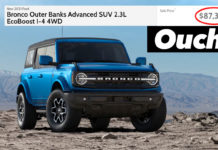You know when the sentence begins with the words, "This revelation
was buried within Chrysler's bankruptcy filings" it can't be good news.
And it certainly is not good news for the Obama administration or for Chrysler.
CNN
is reporting that, "Chrysler LLC will not repay U.S. taxpayers more
than $7 billion in bailout money it received earlier this year and as
part of its bankruptcy filing."
The story goes on to detail how Chrysler recent bankruptcy was structured, and I fear you can probably guess the rest.
The
rest being that a deal that was struck in some back rooms in Washington
leaving the U.S. tax payer with pretty much nothing to show for the $7
billion bailout given to Chrysler so far.
"The reality now is
that the face value [of the $4 billion bridge loan] will be written off
in the bankruptcy process," said the official, who added that the 8%
equity stake that Treasury will be receiving as part of the company's
reorganization is meant to compensate taxpayers for the lost money,"
CNN goes on to report.
If you do the math, and as a journalist
I must confess that I'm really bad at math, you'll eventually arrive at
the number 350,000.
That's the number of Chrysler cars the
Federal government could have purchased with $7 billion dollars—if
you consider that each car costs $20,000.
It is hard not to
wonder what 350,000 more car sales would have meant to Chrysler's
business had the Fed decided to use the money to buy cars instead of
underwrite questionable—no make that—bad loans.
It might
have meant that Chrysler would not be in bankruptcy as 350,000 car
sales would have represented a serious boost to its bottom line.
It
probably would have have meant that President Obama would now be
answering fun questions about that brand new orange Challenger sitting
in the White House garage, instead of hard questions about why exactly
his task force struck a backroom deal that lost tax payers billions,
and why the details of that deal were, "buried within Chrysler's
bankruptcy filings" and not discussed openly and publicly.
And
it certainly would have meant that American tax payers would at least
have something real and of value to show for their tax dollars
instead of what at first glance looks like a text book example of
powerful lawyers, cars executives, and Washington insiders taking care
of their own while the tax payer is left holding the bill.
Click HERE to follow me on Twitter for the latest news and updates.


























